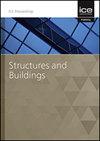Multi-hazard performance evaluation of hillside buildings under earthquake and landslide
IF 1.4
4区 工程技术
Q3 CONSTRUCTION & BUILDING TECHNOLOGY
Proceedings of the Institution of Civil Engineers-Structures and Buildings
Pub Date : 2023-01-04
DOI:10.1680/jstbu.22.00132
引用次数: 0
Abstract
Earthquake-induced landslide, a cascading hazard in the hilly region, can substantially increase the damaging effects of an earthquake. This necessitates the performance evaluation of the buildings situated in the hilly region under landslide-only and landslide following earthquake. The present study assesses the performance of two commonly observed hillside building configurations, i.e., step-back and split foundation, subjected to the above-mentioned multi-hazard scenarios using an uncoupled approach. The uncertainty in the soil properties, which influence the landslide-induced forces, is considered based on laboratory tests of the soil samples collected from active-landslide sites and the existing database of landslide events. Three-dimensional hillside buildings are analysed for uphill-side landslide scenarios by performing force-controlled nonlinear static analyses. Further, a suite of earthquake ground motions is scaled to a predefined intensity level and nonlinear time history analyses are then performed to obtain the damaged state of the buildings prior to assessing the landslide response. It is observed that the earthquake loading history and its direction of excitation significantly affect the response of hillside buildings under landslide following earthquake. Further, it is also observed that the step-back building is more vulnerable to landslide damage as compared to its split foundation counterpart for a given uphill-side landslide scenario.地震滑坡作用下山坡建筑多灾害性能评价
地震引起的滑坡是丘陵地区的一种级联灾害,可以大大增加地震的破坏性影响。这就要求对仅发生滑坡和地震后发生滑坡的丘陵区建筑进行性能评价。本研究采用非耦合方法评估了两种常见的山坡建筑结构,即后退式和劈裂式基础,在上述多灾害情景下的性能。土壤性质的不确定性影响了滑坡诱发力,这是基于从活动滑坡地点收集的土壤样品的实验室测试和现有的滑坡事件数据库来考虑的。采用力控制的非线性静力分析方法,分析了上山坡滑坡情景下的三维山坡建筑。此外,一组地震地面运动被缩放到预定义的强度水平,然后进行非线性时程分析,以在评估滑坡反应之前获得建筑物的损坏状态。研究发现,地震荷载历史及其激励方向对滑坡作用下山坡建筑物的响应有显著影响。此外,还观察到,在给定的上坡滑坡情景下,与分体式基础相比,退后式建筑更容易受到滑坡破坏。
本文章由计算机程序翻译,如有差异,请以英文原文为准。
求助全文
约1分钟内获得全文
求助全文
来源期刊
CiteScore
3.40
自引率
6.20%
发文量
61
审稿时长
12 months
期刊介绍:
Structures and Buildings publishes peer-reviewed papers on the design and construction of civil engineering structures and the applied research associated with such activities. Topics include the design, strength, durability and behaviour of structural components and systems.
Topics covered: energy conservation, people movement within and around buildings, strength and durability of steel and concrete structural components, and the behaviour of building and bridge components and systems

 求助内容:
求助内容: 应助结果提醒方式:
应助结果提醒方式:


